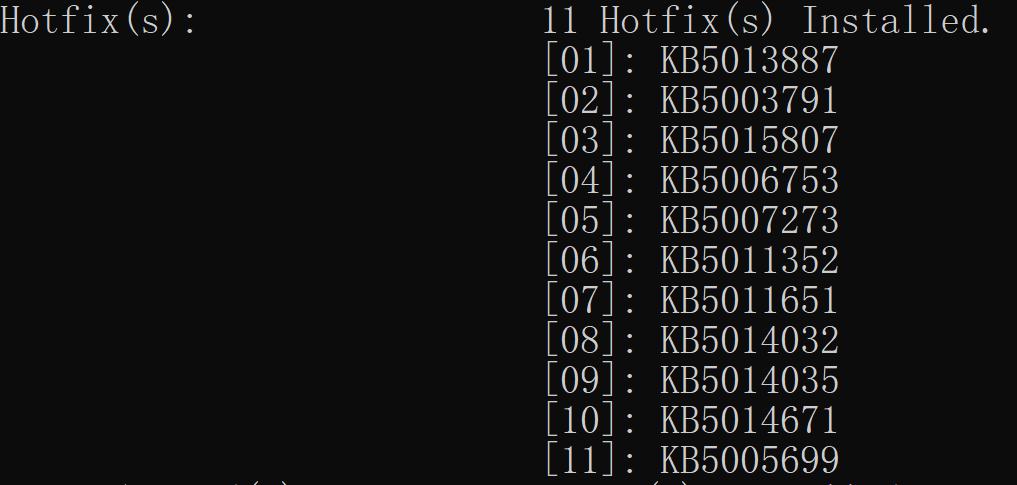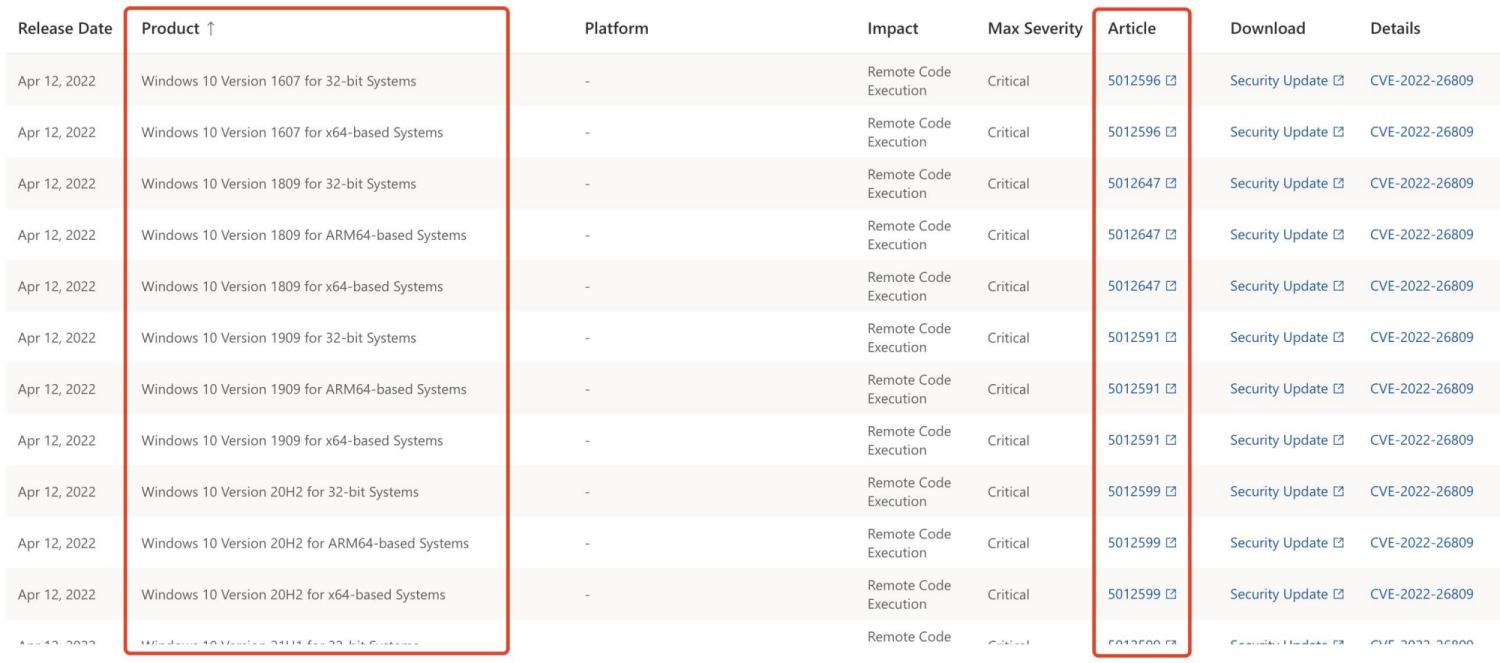1. Summary
| Vulnerability Name | Windows Remote Procedure Call Runtime Remote Code Execution Vulnerability (CVE-2022-26809) |
|---|---|
| Release Time | Apr 13, 2022 |
| Component Name | rpcrt4.dll |
| Affected Versions | Windows 7, 8.1, RT, 10, 11 Windows Server 2008, 2012, 2016, 2019, 2022, 20H2 See Section 3 Affected Versions for details |
| Vulnerability Type | Remote Code Execution |
| Exploitability | Attack Vector: Network Attack Complexity: Low Privileges Required: None User Interaction: None |
| Impact | Severity: CVSS v3 Base Score: 9.8 (Critical) Confidentiality Impact: High Integrity Impact: High Availability Impact: High |
2. About CVE-2022-26809
2.1 Introduction
Microsoft Remote Procedure Call (RPC) is a communication protocol that enables a program to request a service from another computer on the same network without having to understand the details of that computer's network. In modern operating systems like Windows 10 and 11, RPC is also used by applications running on the same machine to communicate with one another and pass instructions.
2.2 Summary
On April 13, 2022, Sangfor FarSight Labs received a notice about a remote code execution vulnerability (CVE-2022-26809) in the rpcrt4.dll file of Microsoft Remote Procedure Call, classified as critical with a CVSS Score of 9.8. To exploit this vulnerability, an attacker would send a specially crafted RPC call to an RPC host. This would result in remote code execution on the server side with the same permissions as the RPC service. Sangfor FarSight Labs has detected exploits of CVE-2022-26809 in the wild, with a recent high of 93 attacks detected on September 19, 2022 (see figure 1 below). Sangfor strongly recommends users to patch their systems as soon as possible according to Section 4 below.

Figure 1. Exploits of CVE-2022-26809 detected by Sangfor from August 27 to September 26, 2022
3. Affected Versions
Windows 7 for 32-bit Systems Service Pack 1
Windows 7 for 32-bit Systems Service Pack 1
Windows 7 for x64-based Systems Service Pack 1
Windows 7 for x64-based Systems Service Pack 1
Windows 8.1 for 32-bit systems
Windows 8.1 for 32-bit systems
Windows 8.1 for x64-based systems
Windows 8.1 for x64-based systems
Windows RT 8.1
Windows 10 Version 1607 for 32-bit Systems
Windows 10 Version 1607 for x64-based Systems
Windows 10 Version 1809 for 32-bit Systems
Windows 10 Version 1809 for ARM64-based Systems
Windows 10 Version 1809 for x64-based Systems
Windows 10 Version 1909 for 32-bit Systems
Windows 10 Version 1909 for ARM64-based Systems
Windows 10 Version 1909 for x64-based Systems
Windows 10 Version 20H2 for 32-bit Systems
Windows 10 Version 20H2 for ARM64-based Systems
Windows 10 Version 20H2 for x64-based Systems
Windows 10 Version 21H1 for 32-bit Systems
Windows 10 Version 21H1 for ARM64-based Systems
Windows 10 Version 21H1 for x64-based Systems
Windows 10 Version 21H2 for 32-bit Systems
Windows 10 Version 21H2 for ARM64-based Systems
Windows 10 Version 21H2 for x64-based Systems
Windows 10 for 32-bit Systems
Windows 10 for x64-based Systems
Windows 11 for ARM64-based Systems
Windows 11 for x64-based Systems
Windows Server 2008 R2 for x64-based Systems Service Pack 1
Windows Server 2008 R2 for x64-based Systems Service Pack 1
Windows Server 2008 R2 for x64-based Systems Service Pack 1 (Server Core installation)
Windows Server 2008 R2 for x64-based Systems Service Pack 1 (Server Core installation)
Windows Server 2008 for 32-bit Systems Service Pack 2
Windows Server 2008 for 32-bit Systems Service Pack 2
Windows Server 2008 for 32-bit Systems Service Pack 2 (Server Core installation)
Windows Server 2008 for 32-bit Systems Service Pack 2 (Server Core installation)
Windows Server 2008 for x64-based Systems Service Pack 2
Windows Server 2008 for x64-based Systems Service Pack 2
Windows Server 2008 for x64-based Systems Service Pack 2 (Server Core installation)
Windows Server 2008 for x64-based Systems Service Pack 2 (Server Core installation)
Windows Server 2012
Windows Server 2012
Windows Server 2012 (Server Core installation)
Windows Server 2012 (Server Core installation)
Windows Server 2012 R2
Windows Server 2012 R2
Windows Server 2012 R2 (Server Core installation)
Windows Server 2012 R2 (Server Core installation)
Windows Server 2016
Windows Server 2016 (Server Core installation)
Windows Server 2019
Windows Server 2019 (Server Core installation)
Windows Server 2022
Windows Server 2022 (Server Core installation)
Windows Server, version 20H2 (Server Core Installation)
4. Solutions
4.1 Remediation Solutions
4.1.1 Check the Component Version
1) Run "systeminfo" in a CMD window and it will display a list of details about the system, including what patches are installed, as shown below.

2) Check if the patch corresponding to your OS is installed. Patches for affected OS versions can be found in the link below: https://msrc.microsoft.com/update-guide/en-US/vulnerability/CVE-2022-26809

3) If the patch is not installed, proceed to "4.1.2 Microsoft Solution" to download and install the patch.
4.1.2 Microsoft Solution
Microsoft has released a patch for affected OS versions to fix this vulnerability. Please download the patch corresponding to the affected OS from the following link: https://msrc.microsoft.com/update-guide/vulnerability/CVE-2022-26809
4.2 Sangfor Solutions
4.2.1 Security Monitoring
The following Sangfor products and services perform real-time monitoring of assets affected by the Windows Remote Procedure Call Runtime Remote Code Execution Vulnerability (CVE-2022-26809):
- Sangfor Cyber Command (Network Detection and Response)
- Sangfor Cyber Guardian (Managed Detection and Response)
4.2.2 Security Protection
The following Sangfor products and services provide protection against the Windows Remote Procedure Call Runtime Remote Code Execution Vulnerability (CVE-2022-26809):
- Sangfor NGAF (Next Generation Firewall)
5. Timeline
On Apr 13, 2022, Sangfor FarSight Labs received a notice about the Windows Remote Procedure Call Runtime Remote Code Execution Vulnerability (CVE-2022-26809).
On Apr 13, 2022, Sangfor FarSight Labs released a vulnerability alert with remediation solutions.
6. Reference
https://msrc.microsoft.com/update-guide/en-US/vulnerability/CVE-2022-26809
7. Learn More
Sangfor FarSight Labs researches the latest cyberthreats and unknown zero-day vulnerabilities, alerting customers to potential dangers to their organizations, and providing real-time solutions with actionable intelligence. Sangfor FarSight Labs works with other security vendors and the security community at large to identify and verify global cyberthreats, providing fast and easy protection for customers.





